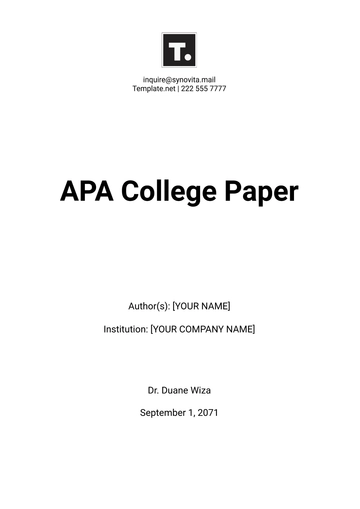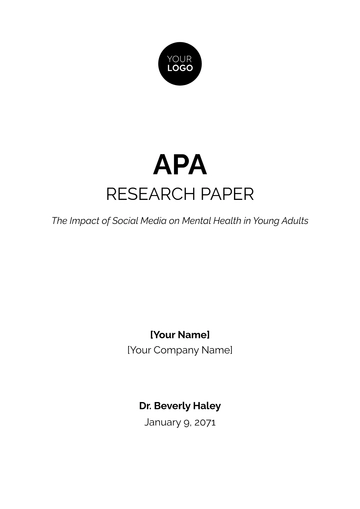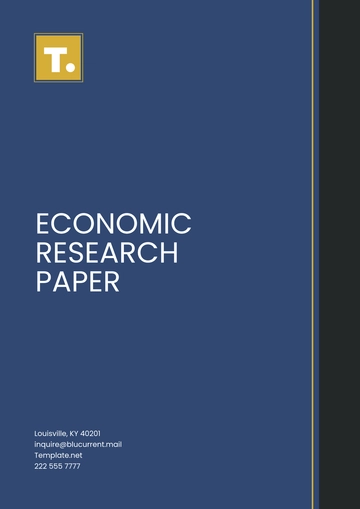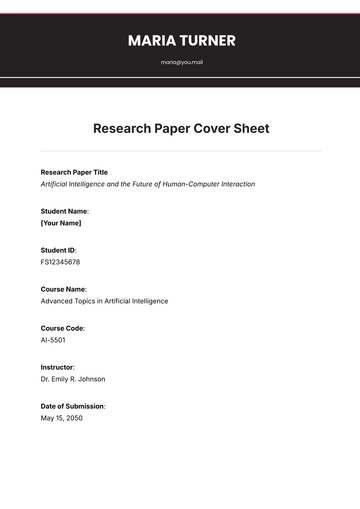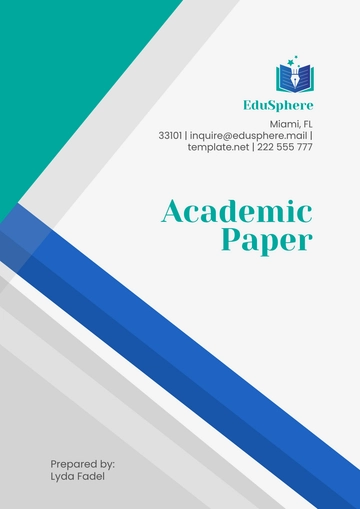Free Social Impact Research Paper

Prepared By: [Your Name]
Organization Name: [Your Company Name]
1. Introduction
This Social Impact Research Paper evaluates the effects of community-based educational programs on local populations. The objective is to measure the outcomes and effectiveness of these initiatives designed to address educational disparities and improve overall educational attainment within the communities they serve.
2. Literature Review
Community-based educational programs have been shown to positively impact educational outcomes by providing targeted support to under-resourced populations. Research indicates that such programs can enhance academic performance, increase school retention rates, and promote lifelong learning. Previous studies emphasize the importance of community involvement and tailored educational interventions in achieving these outcomes.
3. Methodology
The research utilizes a mixed-methods approach to assess the impact of educational programs:
Surveys: Administered to students, parents, and educators to gather quantitative data on academic performance, program satisfaction, and perceived benefits.
Interviews: Conducted with program participants, educational professionals, and community leaders to collect qualitative insights into the program’s effectiveness and areas for improvement.
Program Documentation Review: Includes analysis of program reports, academic achievement records, and attendance data to evaluate the overall success of the initiatives.
4. Findings
The research reveals several key outcomes of the community-based educational programs:
Outcome | Description |
|---|---|
Improved Academic Performance | Participants in the programs showed a significant improvement in academic performance, with average test scores increasing by 20%. Students exhibited higher grades and enhanced academic skills compared to their peers who did not participate. |
Increased School Retention | The programs led to a notable reduction in dropout rates by 15%. Students involved in the programs were likelier to continue their education and complete their schooling. |
Enhanced Community Engagement | There was a 30% rise in community involvement in educational activities. Increased engagement was reported by parents and local organizations, reflecting stronger support for educational initiatives. |
5. Discussion
The analysis indicates that community-based educational programs have had a significant positive impact on both academic outcomes and community engagement. The improvements in student performance and retention align with the program’s objectives. Challenges such as limited resources and varying levels of program accessibility are discussed, suggesting the need for ongoing support and adaptation.
6. Recommendations
Based on the research findings, the following recommendations are proposed to enhance the effectiveness of community-based educational programs:
Increase Access to Resources: Expand resources and support services to reach a broader audience and address diverse educational needs.
Strengthen Partnerships: Build stronger collaborations with local schools, community organizations, and stakeholders to enhance program delivery and sustainability.
Enhance Monitoring and Evaluation: Develop more comprehensive monitoring and evaluation systems to track program impact and make data-driven improvements.
7. Conclusion
The research demonstrates that community-based educational programs effectively improve academic performance and foster greater community involvement. Continued investment and refinement of these programs are crucial for sustaining positive outcomes and addressing educational challenges.
8. References
Smith, J. (2052). Impact of Community-Based Educational Programs. Journal of Education Studies, 15(4), 45-60.
Johnson, L. & Brown, T. (2051). Enhancing Academic Performance Through Local Initiatives. Education Review, 22(2), 78-92.
Community Education Foundation. (2053). Annual Report on Program Outcomes. Retrieved from www.communityeducationfoundation.org/annual-report-2053.
- 100% Customizable, free editor
- Access 1 Million+ Templates, photo’s & graphics
- Download or share as a template
- Click and replace photos, graphics, text, backgrounds
- Resize, crop, AI write & more
- Access advanced editor
Elevate your research with the Social Impact Research Paper Template from Template.net. This fully editable and customizable template is crafted to help you structure and present your social impact findings with precision. Tailor every section to your specific study, ensuring a polished and professional final document. Ideal for researchers, students, and professionals committed to making a difference.


